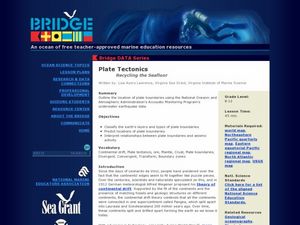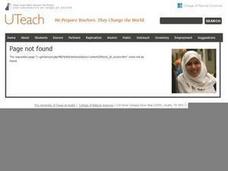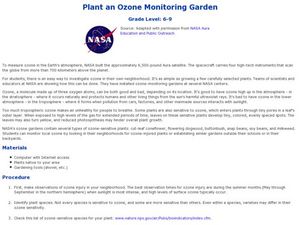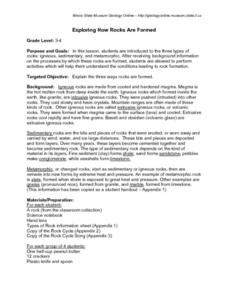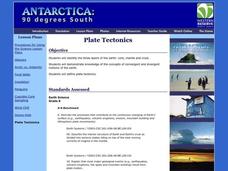Curated OER
Plate Tectonics: Recycling the Seafloor
Young scholars classify earth's layers and plates using Ocean Seismicity data. In this plate tectonics lesson, students outline where the plate boundaries are on the world map. They then compare these predicted boundaries with USGS map...
Curated OER
A Model of Three Faults
Students investigate faults. In this science lesson, students explore the many stresses and strains in the earth's layers and research the types of faults in their state.
Curated OER
Environment: Battling for Oxygen
Students construct an interactive ozone depletion model using gumdrops and toothpicks. After analyzing the data obtained from the model, they record it on butcher paper and complete worksheets about oxygen.
Curated OER
Effects of Ozone in the Air
Fifth graders, in groups, conduct an experiment in which they measure ground level ozone levels using an ozone measuring kit. They analyze and compare the weather conditions and locations where ozone readings are highest and lowest.
Curated OER
Greenhouse Gases: The Chemistry Behind the Culprits
Ninth graders investigate the effect of different gases in the atmosphere. In this chemistry lesson plan, 9th graders explain how these gases contribute to global warming. They suggest possible solutions to this growing problem.
Curated OER
Plant an Ozone Monitoring Garden
Students create a garden. In this ozone lesson, students discuss ozone injury, identify plants sensitive to ozone, and then plant their own ozone garden.
Science 4 Inquiry
Edible Plate Tectonics
Many people think they can't observe plate tectonics, but thanks to GPS, we know that Australia moves at a rate of 2.7 inches per year, North America at 1 inches per year, and the Pacific plate at more than 3 inches per year! Scholars...
Curated OER
Exploring How Rocks Are Formed
These lessons produced by the Illinois State Museum are quite good. In this one, third and fourth graders are introduced to the three basic types of rocks: igneous, sedimentary, and metamorphic. They perform activities which help them...
Curated OER
The Formation of Coal
In this coal formation worksheet, students read and informational sheet about coal formation. Students are given 5 short-answer questions regarding what they've read.
Teach Engineering
Dress for Success
Dressing for success is not always about looking sharp. Sometimes it is about staying warm and dry. Present your class with an activity that challenges groups of pupils to design a layered material for blizzard conditions. The teams test...
Curated OER
Air Quality Issues
Students study and chart the levels of the atmosphere. They determine volume and location of the whole in the ozone layer by problem solving and drawing Antarctica.
Curated OER
Core
Eighth graders examine conditions that can lead to the formations found and correlate the layers. In this rock layers lesson students complete an activity that allows students to take their own "core sample".
Curated OER
Where is Water Found?
Fourth graders examine the amount of water and its distribution on Earth. As a class, they brainstorm a list of where water can be found and classify the places according to salt water, fresh water or glaciers. They estimate how much...
Curated OER
Water Systems
In this water systems worksheet, students refer to their textbook to complete questions about the amount of water on earth and the portion of water in various forms. Students review porosity, permeability, and water table. This worksheet...
Curated OER
Science: What Happens to Create the Lode?
Students understand how mineral deposits are formed and why they are not evenly dispersed. They create and describe three different precipitates from four solutions simulating mineral ore deposit formation in sedimentary rock.
Curated OER
Air Quality and Transportation
Second graders study about air pollution and the effects it has on our Earth. Students tally cars on a sheet that has been categorized as follows: One person in car, two persons in car, or three or more persons in car. Students go to...
Curated OER
Hot, Cold, Fresh and Salty
Pupils observe the effects of layering water and what is more or less saline than normal. In this geoscience lesson students create saline solutions, layer them and observe how the water becomes different temperatures in different layers.
Curated OER
Plate Tectonics
Students identify the three layers of the earth: core, mantle and crust. They demonstrate knowledge of the concepts of convergent and divergent motions of the earth and an understanding of plate tectonics.
Curated OER
Mountain Building
Teacher prepares four layers of Plasticine stacking layers on top of each other to create a model of how rocks within the earth can be folded creating anticlines and synclines below the surface and mountains and valleys on the surface.
Curated OER
What's the Connection Between Convection and Inversion?
Ninth graders observe a simulation demonstrating the difference between convection and inversion. They explain where and when convection and inversion layers occur and how each impacts air quality, and by connection, human health.
Curated OER
Using Radiosonde Data From a Weather Balloon Launch
Student use radiosonde data from a weather balloon launch to distinguish the characteristics of the lower atmosphere. They learn the layers of the atmosphere. They graph real atmospheric data.
Curated OER
Cupcake Core Sampling
Students discuss core samples. In this environment lesson, students experiment discovering what is beneath the surface by using cupcakes as models finding out what sort of layers are found within the cupcakes.
Curated OER
Ice Core Clues
Students create a PowerPoint presentation on the information they research about the ice cores and what they tell us about Earth's past. In this ice core lesson plan, students research radioactivity, air pollution, sodium, snowfall...
Curated OER
As the Sun Burns
Students examine the types of light the sun gives the Earth. They describe the electro-magnetic spectrum and how to protect themselves from different types of light. They identify the layers of the atmosphere as well.


